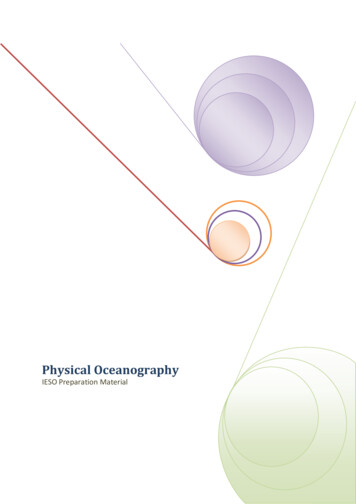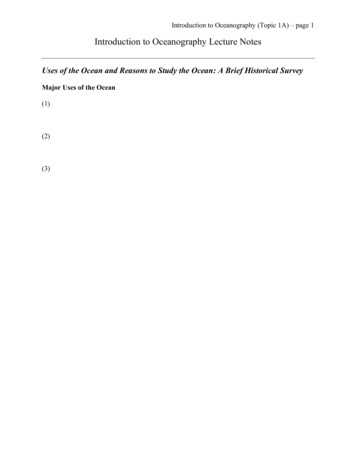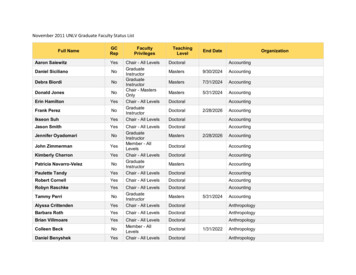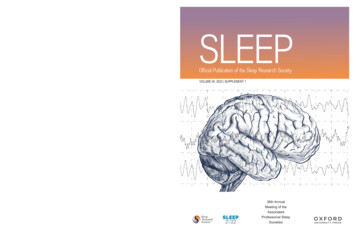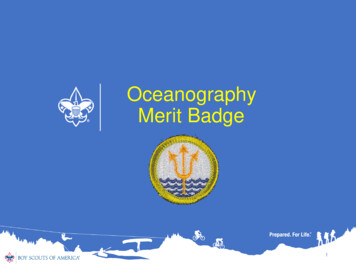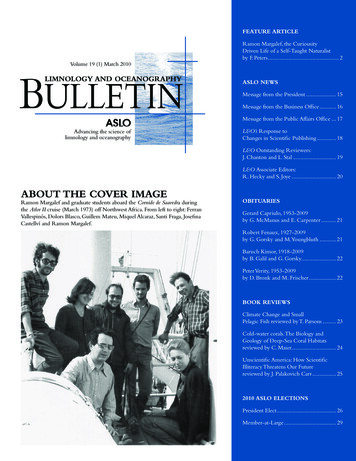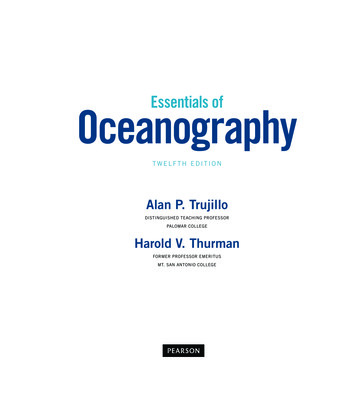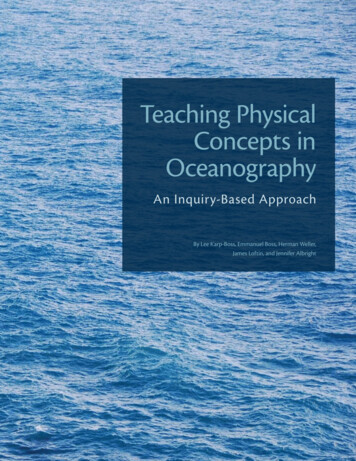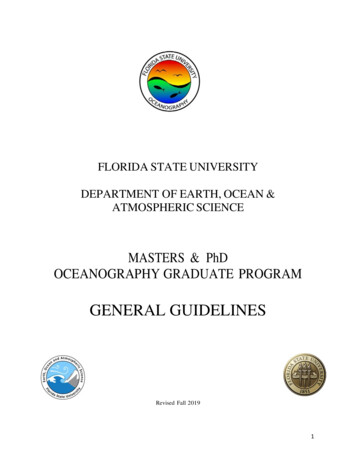
Transcription
FLORIDA STATE UNIVERSITYDEPARTMENT OF EARTH, OCEAN &ATMOSPHERIC SCIENCEMASTERS & PhDOCEANOGRAPHY GRADUATE PROGRAMGENERAL GUIDELINESRevised Fall 20191
ADMISSIONS POLICY FOROCEANOGRAPHY M.S. AND Ph.D. DEGREESAny degree-seeking student with at least a B.S. or B.A. degree may apply to enter theMaster's program. Most successful applicants, without a Master's degree in oceanographyor environmental science or a closely allied field, are accepted into the Master's degreeprogram. However, such applicants, as well as applicants with Master's degrees inoceanography or a related field, may also apply directly to the Ph.D. program. Admissionto the M.S. or Ph.D. program is granted upon a favorable majority vote of theoceanography faculty and upon agreement of a faculty member to act as a majorprofessor.MAINTENANCE OF ACTIVE STUDEN STATUSMinimum StandardsIn order to remain in the Oceanography Graduate Program, a student must(1) be registered or be on a departmentally approved leave of absence (see below)(2) be enrolled for 9 – 12 hours each semester as advised(3) maintain a cumulative grade point average of at least 3.0(4) make satisfactory progress in research(5) comply with all other University requirements as stated in the Florida State UniversityGeneral Bulletin(6) have a major professorSatisfactory progress in (4) is determined by the student’s supervisor committee.Committee MeetingsThe student’s thesis/dissertation committee should meet with the student at least once ayear and report the student’s progress to the Chair.Leaves of AbsenceA student who cannot register for any semester (including summer) should submit a writtenleave-of-absence request, approved by the major professor, to the Chair of the department.A student not registered for two or more successive semesters must comply with theUniversity requirement and apply for admission through the University’s Office ofAdmissions. Such admission will not be automatic, but must be reviewed by the student’sthesis/dissertation committee and the program faculty.February 1996/June 2000/July 2010/August 2012
DismissalA student may be dismissed from the graduate program in Oceanography for notcomplying with any of the reasons listed above under Minimum Standards. The dismissal ofa student who has fallen below any of the minimum standards (1)-(5) will be by majorityvote of the student’s committee. If a student does not have a committee, one should beformed to consider the student’s standing. If the committee votes to dismiss a student, thestudent and the Department Chair should be notified in writing by the major professor.Dismissal under minimum standard (6) is discussed in the next paragraph.The Major ProfessorBecause degrees from this program require research, a student must have a major professor.The major professor sponsors the student’s admission and provides guidance and facilitiesduring the student’s tenure. A student may change major professors if a new major professoris willing to accept the role. The Chair and the original major professor should be notified inwriting by the new major professor when such a change is made.If a major professor dies, becomes incapacitated or leaves the department, the Chair willarrange for the student and the student’s advisory committee to meet with the Chair as soonas possible. At this meeting, the student’s options will be discussed and a time limit set fora grace period during which the student does not have a major professor. If a student cannotfind a major professor during this grace period, then the student will be informed in writingby the Chair that he or she is no longer a student in the department.A major professor has the right to resign from the supervision of a student by notifying thestudent and the Chair in writing. Upon receipt of the resignation, the Chair will arrange forthe student and the student’s advisory committee, minus the original major professor, tomeet with the Chair as soon as possible. At this meeting, the student’s options will bediscussed and a time limit set for a grace period during which the student does not have amajor professor. If a student cannot find a major professor during this grace period, then thestudent will be informed in writing by the Chair that he or she is no longer a student in thedepartment.Content and Form of the Thesis and DissertationThe faculty recognizes that there is no set content and form for the written thesis ordissertation. Each student and his/her committee must agree in advance on the format ofthe written document. The format should be noted at the time the committee approvesthe prospectus. Information on formatting is available through the F S U G r a d u a t eSchool ).Voluntary SeparationA student may leave the program at any time by notifying the Chair in writing andreturning all FSU material.Throughout this document Chair refers to the EOAS Department Chair or his/her designated representativein the Oceanography program.February 1996/July 2004/July 20103
OCEANOGRAPHY&AQUATIC ENVIRONMENTAL SCIENCETHESIS MASTER'SDEGREE PROGRAMS4
A. GENERAL REQUIREMENTSThe Master's degree program by thesis requires 33 semester hours of course work of which6 hours must be thesis credits OCE 5971r.The required course work must be taken in the Earth, Ocean & Atmospheric Science Dept orin other scientific disciplines as the individual's interest and thesis project dictate. At least 18of the total hours of course work must be taken on a letter grade basis (A, B, C .). Of theremaining credits, a student may enroll for no more than 6 hours of coursework on aSatisfactory/Unsatisfactory basis during the Master's degree program in courses where lettergrades are routinely given. This restriction does not apply to courses normally offered on thebasis of the "S/U" grading system.No more than 3 hours of Supervised Research (OCE 5910) and 3 hours of SupervisedTeaching (OCE 5940) may be applied toward fulfilling the 33 hour degree requirement.The Board of Governors funds a maximum of three hours of Supervised Research and threehours of Supervised Teaching per graduate student for M.S. degree program.A graduate student registered for an individual study course (DIS) must attend at least oneconference a week with his/her major professor.The Oceanography program makes no mandatory program-wide requirement of aforeign language for M.S. degree. In specific cases, however, a student's advisory committeemay require demonstration of foreign language skills appropriate to the student's specialty.Only courses numbered 5000 or above are normally to be taken by graduate students. Agraduate student's committee or the department may, however, permit the student to takespecified 4000 level courses in the degree program. Such 4000 level courses may becredited toward a graduate degree but they are not factored into the graduate GPA.The program requires that each student preparing for the M.S. degree attain a grade of A orB in the introductory survey 'core' courses (see Course Requirements). Course credit maybe transferred from another department or institution as a substitute for an oceanographycore course if approved by the FSU instructor of that particular course, and so requested bythe student's advisor and according to the rules set by the University.The University requires that all work for the Master's degree must be completed withinseven years from the time of the student's initial registration. Two to three years arenormally needed to complete the course work and research for the Master's degree.Any degree seeking student with at least a B.S. or B.A. degree* may apply to enter theMaster's program. Admission into the program is granted upon a majority vote of thefaculty.* there are some exceptions5
B. THESIS COMMITTEEThe Oceanography program has an established procedure for following eachstudent's academic progress. The student must choose a thesis supervisory committeeby the end of the student's fourth academic semester in residence. The composition ofthe committee must be as follows:a) The committee must consist of at least three faculty members all of which must holdGraduate Faculty Status;b) One of these must be an Earth Ocean & Atmospheric Science professor whosework lies outside the student's specialty area;c) Two of the members must be from the Oceanography program;d) Two members must be well acquainted with the student's area of specialization:e) The Chair must approve all committees.Before the end of the student's fourth academic semester in residence in the Oceanographyprogram, the student's committee must submit to the Chair and to the student itsassessment of the student's work and capabilities, and its recommendations about the futureof the student in the program. The committee must decide whether the student should beallowed to continue in the program. A written committee report covering these pointsmust be put in the student's departmental file by the major professor.The student's committee, by means of annual conferences and examinations, must evaluateand report in writing the student's progress to the Chair. The reports will be made availableto the student and the academic dean.C. COURSE POLICY(listed at end of PhD program, page 15)6
Thesis HoursThe student must register for thesis credits each term in which a substantial amount of workis being done on the thesis. A student who has completed the required coursework andcontinues to use campus facilities and/or receive faculty supervision but who has not madea final thesis submission shall register for a minimum of two hours of thesis per term. Theexact number of hours shall be determined by the major professor based on the proportionof faculty/staff time, facilities and other resources needed to support the student.Thesis ProspectusEach student must, by the end of the fourth academic semester of residence, submit to thecommittee a thesis prospectus. For example, a student entering the program in the fallwould do this before the end of the next fall semester. This prospectus should outline brieflythe research proposed by the student; it will be the basis for the subsequent thesis. Awritten copy, dated and signed by all the members of the advisory committee, must beplaced in the student's departmental file.Thesis DefenseRegistration shall be required in the final term in which a degree is granted and shall consistof a minimum of two semester hours of thesis credit even if the student has completed therequirements for the degree in previous semesters. This is to reimburse the university for theadministrative costs of manuscript clearance and final degree clearance procedures.When a student plans to defend a thesis, s/he should register for OCE8976 (Master's ThesisDefense) and sign up for graduation at my.fsu.edu. A student not defending during theanticipated semester will have to sign up for graduation again at the beginning of thefollowing semester. S/He does not need to register for OCE8976 again. A copy of theUniversity guidelines for writing and submitting the thesis may be found s. For clarification of information on the web page contact the Manuscript andFinal Clearance Advisor in The Graduate School (314 WESCOTT).The student must submit a copy of the thesis to committee members (electronic or paper asrequested) at least four weeks before the announced defense. This defense copy should beessentially complete and legibly typed. The student should meet with each committeemember prior to the defense to discuss the defense copy. An additional copy, approved bythe student's major professor for this purpose, must be placed in the office of the AcademicCoordinator (3008C EOA) at least two weeks before the defense; simultaneously, thestudent must announce the date, time and place of the defense to the department andseparately submit this information to The Graduate School for posting.The defense seminar will be open to the public and is designed to give the student anopportunity to present his/her research and to respond to criticism. The defenseexamination will be administered by the student's committee. After the thesis has beensuccessfully defended, the student will prepare a final copy of the thesis acceptable to thestudent's committee. This corrected version will be signed by the committee and theDepartment Chair.7
Students must complete the entire manuscript clearance process within 60 days of thedefense of their thesis. If a student is unable to successfully complete the entire processwithin the 60 days, he/she will have re-do the defense.For a list of items that must be submitted to the Manuscript and Final Clearance Advisor ceportal A copy of the final manuscript will be provided to the University libraries.GUIDELINES FOR BYPASSING THE MASTERS DEGREEIt is also possible that a student in the Master's program may bypass the Master's degreeupon completion of the following procedure. The student's M.S. committee should submitto the Admissions Committee:1. A strong letter of recommendation for by-passing the M.S. degree. This lettershould come from the entire committee.2. The student's complete up-to-date departmental folder, includinga. Undergraduate recordb. Complete graduate recordc. GRE scores, and both undergraduate and graduate GPA'sd. All letters of recommendation for student's initial admission to FSUe. Written records of all meetings of the student's MS committee.If the Admissions Committee approves admission directly to the Ph.D., the admission mustbe further approved by a majority vote of the whole academic faculty of the Oceanographyprogram. Following that approval, formal admission will be made through the Office ofGraduate Admissions.8
OCEANOGRAPHY&PHYSICAL ENVIRONMENTAL SCIENCEPH.D. DEGREE PROGRAMS9
A. GENERAL REQUIREMENTSThe Ph.D. degree in Oceanography is not awarded upon the completion of any specificnumber of courses or at the end of any specific period. T h e s p e c i f i c co u r s er e q u i r e m e n t s i n a s tu d e n t ’ s p ro g r a m o f s t u d y a r e s e l e c t e d to m e e t th en e e d s a n d c a r e e r o b j e c tiv e s o f th e in d iv i d u a l s tu d e n t. Candidates mustdemonstrate that they have competence in the subject matter of the core courses and intheir field of special interest and that they are capable of doing independent scholarlyresearch leading to a dissertation which should be a contribution to the science ofoceanography. The candidate for the Ph.D. degree is required to take at least 18 semesterhours in areas related to the student's specialty in addition to the general M.S. requirements.The content of these 18 hours will be determined by the student, their advisor andthe student’s supervisory committee. These requirements apply to students enteringthe Ph.D. program with an M.S. degree in a related field as well as students with anM.S. in Oceanography. Also, all students must take 24 semester hours of dissertation(OCE6980).If a student is working toward the Ph.D. degree without completing the M.S. degree, theM.S. minimum course requirement of 33 semester hours must be fulfilled as well as thePh.D. requirements.Students completing the Florida State University M.S. degree may be readmitted to thePh.D. program upon a favorable majority vote of the faculty.A graduate student registered for an individual study (DIS) course must attend at least oneconference a week with his/her major professor.The University requires that a student's Ph.D. program may include no more than 9 semesterhours of course work on a Satisfactory/Unsatisfactory basis in courses where letter grades areroutinely given. Also, no more than 5 semester hours of Supervised Research (OCE 5910)and 5 semester hours of Supervised Teaching (OCE 5940) may be applied toward fulfillingthe course requirements. The Board of Governors funds a maximum of five hours ofSupervised Research and five hours of Supervised Teaching per graduate student per degreeprogram.There is no department-wide language requirement for the Ph.D. degree; the student'sadvisory committee may require demonstration of foreign and native language skills usefulin the student's special area of study.Only courses numbered 5000 or above are normally to be taken by graduate students. Agraduate student's committee or department may, however, permit the student to takespecified 4000 level courses in the degree program. Such 4000 level courses may becredited toward a graduate degree but they are not factored into the graduate GPA.10
The program requires that each student preparing for the Ph.D. degree attain a grade of A orB in the introductory survey 'core' courses (see Course Requirements). Course credit maybe transferred from another department or institution as a substitute for an oceanographycore course if approved by the FSU instructor of that particular course, and so requested bythe student's advisor and according to the rules set by the University. Any student deficientin the core courses must complete these courses or their equivalent promptly, with a gradeof A or B.The student may register for Dissertation (OCE 6980) only after passing the Ph.D.Preliminary Examination.All requirements for the degree must be completed within five calendar years from the timestudent passes the Preliminary Examination. Four to seven years are normally needed tocomplete the course work and research for the Ph.D. degree.Any degree-seeking student with at least a B.S. or B.A. degree* may apply to enter thePh.D. program. Admission to the Ph.D. program is granted upon a favorable majority voteof the faculty.* there may be some exceptionsB. SUPERVISORY COMMITTEEThe Program has an established procedure for following the progress of each student's work.The student must choose a supervisory committee by the end of the student's fourthacademic semester in residence. The composition of the committee must be as follows:a)b)c)d)e)f)g)The committee must consist of at least five faculty members, four of whommust have Graduate Faculty Status;One of these must be an oceanographer whose work lies outside the student'sspecialty area,Two of the members should be familiar with the student's area ofspecialization,Two of the members must be from the Oceanography program,One member (the University Representative) must be a tenured Florida StateUniversity faculty member with Graduate Faculty Status from outside theDepartment of Earth, Ocean and Atmospheric Science,The major professor and at least three other members including theRepresentative at Large must have Graduate Faculty Status,The Chair must approve all committees.The student must complete a Doctoral Supervisory Committee form, which lists all themembers of the committee along with their initials indicating their approval, and submit theform to the Academic Coordinator (3008C EOA).11
The students committee, by means of annual conferences and examinations, must evaluateand report in writing the students progress to the student, the chair and the academic dean.The student will receive an annual evaluation from their major professor. The Dean of TheGraduate School, the academic dean, and the chair of the major department may attendcommittee meetings as nonvoting members. Non-graduate faculty may assist a student ona supervisory committee, but cannot vote or sign the dissertation.The University Representative is responsible for ensuring that University policies arefollowed, and that decisions made by the supervisory committee reflect the collectivejudgment of the committee. Therefore, the graduate faculty representative must besomeone who is free of conflicts of interest with other members of the committee. Ifquestions arise they should be referred to the Dean of The Graduate School for resolution.Ph.D. Preliminary ExaminationAs required in all Ph.D. programs at Florida State University, each student must pass thePreliminary Examination for admission to Ph.D. candidacy. The first attempt of the Examcan be taken as early as the third academic semester, but no later than the fifth academicsemester in residence after admission to the Oceanography Ph.D. program. The studentshould register for Preliminary Doctoral Examination (OCE 8964) at the beginning of thesemester in which the exam is scheduled. In the event of a non-satisfactory exam andaccording to FSU policy, a student may be reexamined only once. The second a n d f i n a le x a m a t t e m p t , if necessary, must be taken within two semesters of the first attempt.The second attempt at the preliminary exam shall occur no sooner than six full class weeks afterthe results of the first attempt are shared with the student. A “full class week” is defined as aweek with five days during which classes are held at FSU. Students must be registeredseparately for their first and second attempt, if necessary within the same semester, and mustreceive either a “pass” or a “fail” grade for each attempt.An exception request regarding the timing of the re-examination can be submitted forconsideration to the Academic Dean’s Office by either the student or the supervisory committee.The Preliminary Examination will have both a written section and a subsequent oralsection. It must be announced to all Oceanography faculty and to the student's committeeat least two weeks before the written portion. The full Oceanography faculty must besolicited for written examination questions. The solicitation will include a list of thestudent's current and completed coursework (in the degree program), the names of thestudent's major professor and Ph.D. committee members, and the proposed topic of thedissertation. The student's committee will screen questions and prepare and administer theexamination. The oral examination, given after the written examination, must beannounced and be open to the full Oceanography faculty. Examination results must bereported to the Chair and to the academic dean. Passed examinations must be reported tothe Registrar. Examination questions, scores and answers must be placed in the student'sacademic folder.The Physical Oceanography preliminary exam is administered only in the fall and springsemesters to coincide with other departments/programs that cover some similar content.A folder containing copies of all written Preliminary Examination questions, identifying the12
authors of the questions, will be kept on file in the program office. The folder will be opento the students and faculty.A student must be admitted to candidacy (i.e., passed student's Preliminary Examination) atleast six months prior to the granting of the Ph.D. degree.A student who has passed the Preliminary Examination is considered a candidate for thedoctoral degree and is eligible to register for dissertation credits. Dissertation credits mayunder limited circumstances be retroactively added for the semester in which a preliminaryexam was completed.All requirements for the degree must be completed within five calendar years from the timethe student passes the Preliminary Examination or the student's supervisory committee willrequire that a new Preliminary Examination be passed. However, it is the intent of thedepartment that the student complete the Ph.D. degree program in no more than five yearsfrom the date of first registration.Dissertation HoursThe student must register for dissertation credits each term in which a substantial amount ofwork is being done on the dissertation. A student who has completed the requiredcoursework and continues to use campus facilities and/or receive faculty supervision butwho has not made a final dissertation submission shall register for a minimum of two hoursof dissertation per term. The exact number of hours shall be determined by the majorprofessor based on the proportion of faculty/staff time, facilities and other resourcesneeded to support the student.Dissertation ProspectusThe student’s dissertation prospectus should be submitted for consideration by thecommittee before the end of the semester following the successful completion of thePreliminary Exam. The prospectus, outlining briefly the research proposed by the student,is the basis for the subsequent dissertation and must be discussed with the committee. Awritten copy, dated and with signatures indicating committee approval, must be placed inthe student's departmental file before the end of the second semester following thePreliminary Exam.Dissertation DefenseRegistration shall be required in the final term in which a degree is granted and shall consistof a minimum of two semester hours of dissertation credit even if the student hascompleted the requirements for the degree in previous semesters. This is to reimburse theuniversity for the administrative costs of manuscript clearance and final degree clearanceprocedures.Prior to the defense of dissertation, the student should register for OCE 8985 (DissertationDefense) and sign up for graduation at m y . fsu.edu, Apply for Graduation. A student notdefending during the anticipated semester must remove themselves from the Registrars list13
and sign up for graduation again at the beginning of the following semester; and does needto register again for Dissertation Defense. A copy of the University guidelines for writingand submitting the dissertation may be found online esis-treatise-and-dissertation. Forclarification of information on the web site contact the Manuscript and Final ClearanceAdvisor in The Graduate School (314 WESCOTT).The student must submit a paper copy of the dissertation (unless otherwise requested) to allcommittee members at least four weeks before the announced defense. This defense copyshould be complete and must be legibly typed. The student should meet with eachcommittee member prior to the defense to discuss the defense copy. An additional copy,approved by the student's major professor for this purpose, must be placed in the office ofthe Academic Coordinator (333A OSB) at least two weeks before the defense;simultaneously, the student must prepare and post a flyer announcing the date, time andplace of the defense.At least two weeks prior to the date of the examination in defense of dissertation, thestudent will present an announcement of the dissertation title, date and place of thedefense seminar to The Graduate School. Note this separate from the announcement of thedefense to the department.The defense seminar (required of all Ph.D. candidates) will be open to the public and isdesigned to give the student an opportunity to present the dissertation research and torespond to criticism. The subsequent defense examination will be administered by thestudent's committee, and open to all the departmental faculty. After the dissertation hasbeen successfully defended, the student will prepare a final copy acceptable to thecommittee. This corrected version will be signed by the committee and the Chair.As of August 2009, students must complete the entire manuscript clearance process within60 days of the defense of their dissertation. If a student is unable to successfully completethe entire process within the 60 days, he/she will have redo the defense.For an overview of items that must be submitted to the Manuscript and Final ClearanceAdvisor see ortal A copy of the final manuscript will be provided tothe University libraries.A University Representative Doctoral Defense Report form should be submitted online bythe University Representative on the students committee to the Dean of The GraduateSchool, within one week after the date of defense.14
C. COURSE POLICY (Master’s and Ph.D. Programmes)Course requirements for Aquatic Environmental Science Thesis studentsThesis Master’s Aquatic Environmental ScienceAquatic Environmental Science Master’s thesis students are required to take the core courseOCE 5018 Current Issues in Environmental Science (this may be waived if the student took thecourse as an undergraduate at FSU as OCE 4017)and it is recommended that the AES thesis students also take the core courses:GLY 5267 Stable Isotopic Tracers in the EnvironmentMET 6480 Biogeochemical Cycles and Global Changeand three or more of the following specialty courses dependent on the students needs*:BSC 5932 Modeling in RBSC 5936 Quantitative Methods in Ecology and Evolutionary BiologyGIS 5038C Advanced Remote SensingGIS 5101 Geographic Information SystemsGIS 5101L Geographic Information Systems LabGIS 5305 Environmental Analysis and ModelingGLY 5736 Marine GeologyGLY 5827 Principles of HydrologyOCB 5050 Basic Biological OceanographyOCB 5635 Coastal Ecology and ProcessesOCB 5636 Marine Microbial EcologyOCB 5930 Systematic Conservation PlanningOCC 5050 Basic Chemical OceanographyOCC 5052 Aquatic ChemistryOCC 5415 Marine GeochemistryOCC 5554 Atmospheric ChemistryOCC 5930 Organic Geochemistry of Natural Waters and SedimentsOCC 5930 Rivers and WetlandsOCE 5065 Marine Conservation BiologyOCE 5077 Marine Environment PollutionURP 5422 Coastal Planning* Other classes may meet the students requirements but must be approved by the supervisor and committee.15
Course requirements for Biological Oceanography studentsMaster’s Program Biological OceanographyMaster’s students are required to take all core courses that are offered:OCC 5050Basic Chemical OceanographyOCG 5051Basic Geological OceanographyOCP 5050Physical OceanographyMaster’s students are also required to take the following courses:OCB 5636Marine MicrobiologyOCB XXXX Marine PlanktonOCB 5639Marine Benthic EcologyOCB 5939Biological Oceanography Semin
florida state university department of earth, ocean & atmospheric science masters & phd oceanography graduate program general guidelines revised fall 2019 . 2 admissions policy for oceanography m.s. and ph.d. degrees . degree programs . 5 a. general requirements
